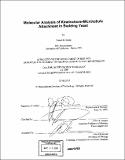Molecular analysis of kinetochore-microtubule attachment in budding yeast
Author(s)
Rines, Daniel R. (Daniel Roger), 1966-
DownloadFull printable version (9.343Mb)
Other Contributors
Massachusetts Institute of Technology. Dept. of Biology.
Advisor
Peter K. Sorger.
Terms of use
Metadata
Show full item recordAbstract
Kinetochores bind to microtubules and are responsible for chromosome segregation and the accurate transmission of genetic information during cell division. Kinetochores are DNA-protein complexes that assemble on centromeric DNA sequences. In budding yeast, the kinetochores consist of approximately fifty proteins that are organized into a large multi-subunit complex. Multiple kinetochore proteins are thought to work together in establishing, sensing and maintaining the microtubule attachment. Following attachment, kinetochores act to couple microtubule force generation to chromosome movements. Microtubule associated proteins are also thought to play a key role in this process by regulating plus-end microtubule dynamics and tensile force generation. However, the actual molecular mechanism of force generation is unclear. We have used a combination of live-cell imaging, biochemical and genetic techniques in the budding yeast, S. cerevisiae, to identify ten kinetochore subunits and elucidate their roles in microtubule attachment. Among these proteins are microtubule binding proteins and a molecular motor with homologues in animal cells. By analyzing the changes in chromosome positioning and dynamics in various kinetochore mutants, we show that different kinetochore proteins are required for the imposition of tension on paired sister kinetochores and for correct chromosome motion throughout the cell cycle. Utilizing 3D comparative motion analysis of the chromosomes has revealed that kinetochore proteins essential for microtubule attachment in early S-phase are not required at other points in the cell cycle. Our results suggest that different subsets of kinetochore proteins regulate the dynamic nature of microtubule growth and shrinkage for the generation of mechanical force and proper chromosome segregation.
Description
Thesis (Ph. D.)--Massachusetts Institute of Technology, Dept. of Biology, 2003. Includes bibliographical references.
Date issued
2003Department
Massachusetts Institute of Technology. Department of BiologyPublisher
Massachusetts Institute of Technology
Keywords
Biology.